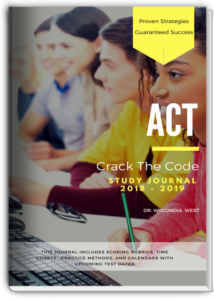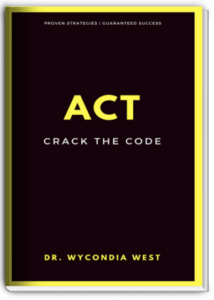I have the pleasure of working with so many students who are striving to increase their ACT scores. Unfortunately, students show up to my ACT classes on various academic levels. Some students have a plethora of skills, while others tend to lack basic skills that will guarantee success. Nevertheless, the great equalizer among students is the math section on the ACT. It is evident that students are waiting until their junior and senior year to get serious about the ACT. This is dangerous because they run the risk of forgetting basic pre-algebra, algebra, and geometry skills. Lacking these essential skills can make the math section extremely difficult for the brightest scholar.
I would urge students to get serious about the ACT no later than 10th grade. Even further, it would be wise for students to start prepping and taking the test in 9th grade. Testing early and testing often would guarantee success before senior year. I hate to see these students frustrated during their senior year. Let’s encourage them to start working towards a higher ACT score no later than 9th grade. This will give them plenty of time to work on any deficient math skills. ACT Up!
ACT English tips
There are 4 core sections on the ACT. Here are a few ACT English tips. Which section is the most difficult for you?
Summer tutoring is available!
So, did you know that even the brightest students forget a ton of information during the summer months? Now, think about the child who’s already struggling. Summer tutoring is available! Contact West Instructional Services – CLICK HERE!
Why is there a NEED for Professional Learning Workshops for Middle Grades Educators?
There is a need now more than ever for professional development that emphasizes the middle grade philosophy, policies, and best practices.
1. Across the United States, many of our middle schools are not meeting their annual goals.
2. Middle schools have been called the “weak link” in education.
3. Annually, middle schools are identified as “need improvement” more often than elementary or high schools.
4. The majority of students taking high stakes tests are in the middle grades.
5. Many middle school leaders and educators do not have a good understanding of adolescent behavior.
6. Most educators teaching middle grades have a background in elementary or secondary education.
7. Most institutional programs do not offer credentials for teaching middle grades. (Subject areas are only emphasized!)
8. The U.S. Department of Education has attempted to reform elementary schools through various early literacy programs. High schools have drop-out prevention and job training programs. There has not been any uniformity ever established in the middle grades.
Every middle school educator and leader should know something about William Alexander. He has been called the “father of the American middle school” and he first used the term “middle school” in 1963 while speaking at Cornell University. The term “middle school” means more than just grade configurations such as 5th-8th, 6th-8th, or K-8th. The middle school movement that began in the early 1960’s was meant to establish an appropriate and effective education for young adolescents. Over 50 years later and the struggle continues today in an effort to effectively reach and teach America’s adolescents.








